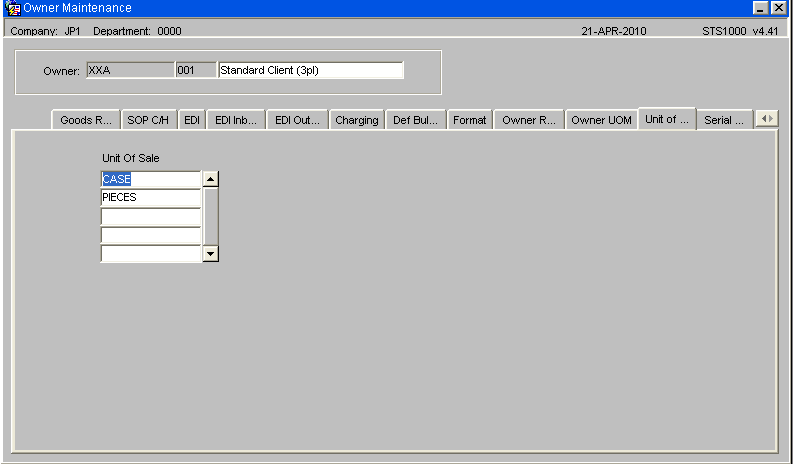Owner Set Up: Difference between revisions
From WMS
Lwinchester (talk | contribs) |
Lwinchester (talk | contribs) |
||
| Line 106: | Line 106: | ||
|- | |- | ||
|Multi Vendor Pallets ||Specifies whether the owner will have more than one supplier – this will flag for a supplier code to be entered at all positive additions to stock quantities (not migrated)||Y or N || | |Multi Vendor Pallets ||Specifies whether the owner will have more than one supplier – this will flag for a supplier code to be entered at all positive additions to stock quantities (not migrated)||Y or N || N | ||
|- | |- | ||
|Cascading Replenishments ** ||Does the owner use cascading replenishment. This is used if the owner has multiple uoms and wishes to cascade the replenishment to each one i.e. unit to box, box to case, case to pallet and back down again (not migrated) || Y or N || N | |Cascading Replenishments ** ||Does the owner use cascading replenishment. This is used if the owner has multiple uoms and wishes to cascade the replenishment to each one i.e. unit to box, box to case, case to pallet and back down again (not migrated) || Y or N || N | ||
Revision as of 09:44, 22 April 2010
INTRODUCTION
This document describes the required screens to be used in setting up the information concerned with the Owners of stock in the warehouse. Other guides describe the set up of company, user, warehouse, stock etc.
This is a generic guide based on the version of the SCE system at the time of writing.
It can also be used by clients to specify their specific data values to aid initial system set up as well as for future reference.
Note that fields marked ‘**’ are mandatory and are needed to ensure correct set up of the system.
Owner Maintenance – Main Tab
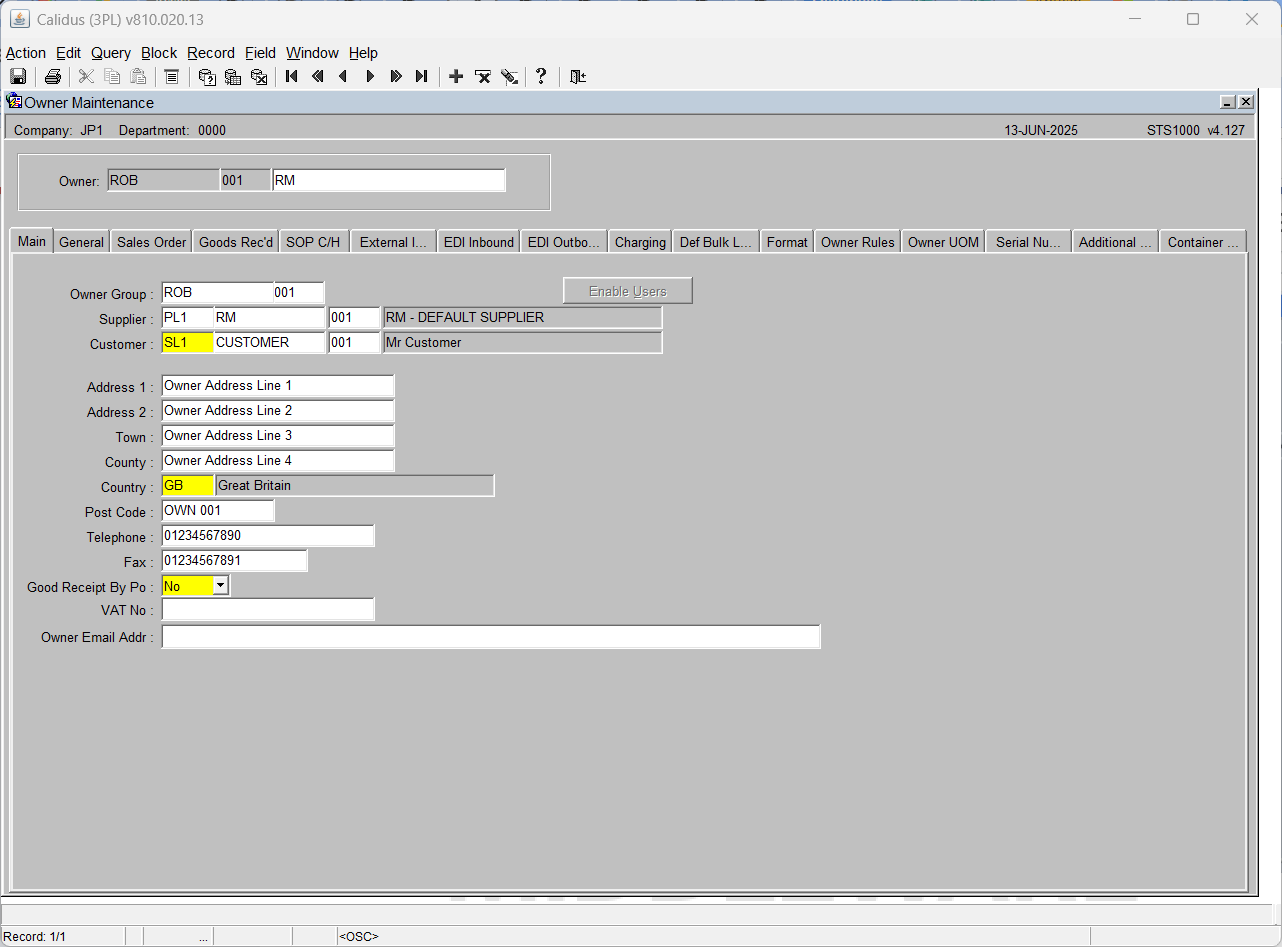
| Field Name | Description | Options | Generic Value |
| Owner ** | Owner code – note, in order to setup an owner from scratch – you must have registry setting ‘OwnerSuperUser’ set to ‘1’ | 10 character free text field – note, for RF and other processing, the owner code must only be 3 characters – LOV available in query mode | Defined by the client |
| SubCode ** (not labelled) | Sub code of the owner – this allows the user to have the same owner code with multiple entries, however, the standard is always ‘001’ | 3 character free text field | 001 |
| Description (not labelled) ** | The name of the owner | 30 character free text field | Defined by the client |
| Owner Group ** | Used for edi reporting purposes, the ability to group multiple owners under one owner. This then becomes the master and the ‘owner group’ – (not migrated) | Must exist in owner maintenance – will default to current owner code – LOV available | Defined by the client |
| Supplier – 1st field – ledger code ** | Ledger code associated with the supplier | Must have been created in ledger codes maintenance and assigned to the user id – always PL1 | PL1 |
| Supplier – 2nd field – supplier code | Default supplier for the owner – this can be used at goods receipt to automatically default in this supplier code at pre advice | Must have been created in partners maintenance – LOV available | Defined by the client |
| Supplier – 3rd filed – supplier sub code | The sub code for the default supplier for the owner | 001 or left blank | Defined by the client |
| Customer – 1st field – ledger code ** | Ledger code associated with the customer | Must have been created in ledger codes maintenance and assigned to the user id – always SL1 | SL1 |
| Customer – 2nd field – customer code | Default customer for the owner | Must have been created in partners maintenance or customer wizard – LOV available | Defined by the client |
| Customer – 3rd filed – customer sub code | The sub code for the default customer for the owner | 001 or left blank | Defined by the client |
| Address 1 | The first line of the address for the owner | 30 character free text field or left blank | Defined by the client |
| Address 2 | The second line of the address for the owner | 30 character free text field or left blank | Defined by the client |
| Town | The town in which the owners address is situated | 30 character free text field or left blank | Defined by the client |
| County | The county in which the owners address is situated | 30 character free text field or left blank | Defined by the client |
| Country ** | The country in which the owners address is situated | Must have been created in country codes maintenance – LOV available | Defined by the client |
| Post Code | The post code for the owners | 10 character free text field or left blank | Defined by the client |
| Tel | The tel no for the owners address | 20 character free text field or left blank | Defined by the client |
| Fax | The fax no for the owners address | 14 character free text field or left blank | Defined by the client |
| Gr By Po ** | Defines whether receipts by purchase orders are required (not migrated) | Y or N | N
|
Owner Maintenance – General Tab
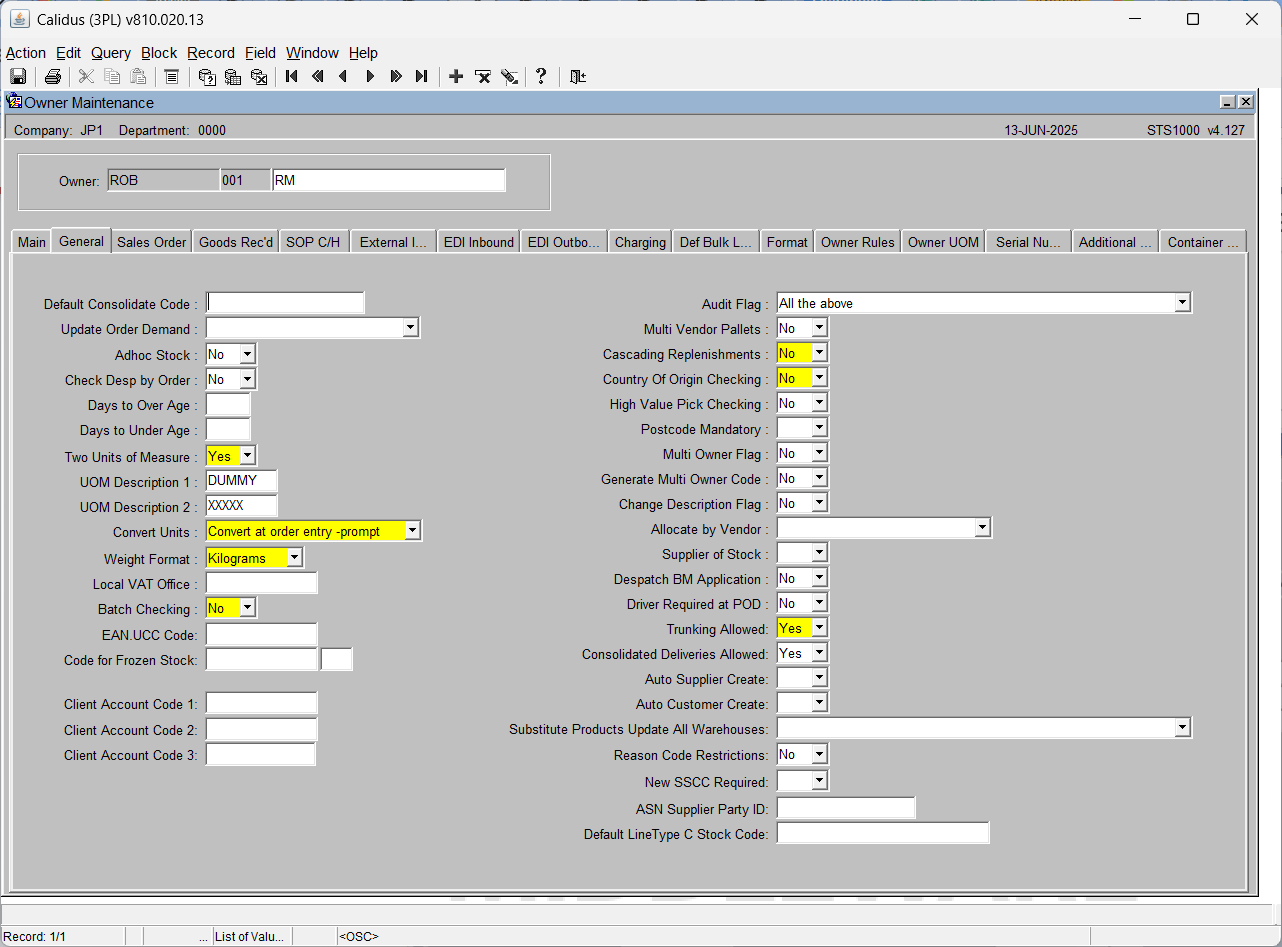
| Field Name | Description | Options | Generic Value |
| Default Consolidate Code | Allows you to enter a code which will validate against the owner’s receipts and orders to be consolidated from collection no. or advice note and order header details – client specific (not migrated) | None | Blank |
| Update Order Demand | Allows you to update the order demand records (used for reporting purposes) – not migrated | 1 – Update with ordered quantity 2 – Update with pick confirmed quantity or left blank |
Blank |
| Adhoc Stock | If set to ‘Y’, allows the user to be automatically taken into the stock set up screen if they enter a product that does not exist (not migrated) | Y or N or left blank | Defined by the client |
| Check Desp by Order | Enables the prevention of despatching orders on a route load individually | Y, N or left blank | Defined by the client |
| Adhoc Customer | If set to ‘Y’, allows the user to be automatically taken into the partners set up screen if they enter a customer that does not exist (not migrated) | Y, N or left blank | Defined by the client |
| Adhoc Supplier | If set to ‘Y’, allows the user to be automatically taken into the partners set up screen if they enter a supplier that does not exist (not migrated) | Y, N or left blank | Defined by the client |
| Days to Over Age | As per the same stock fields, this states how many days the product is in the warehouse before it is over age (see stock maintenance guide for details) – this value will apply to all products for this owner (not migrated) | 0 – 999 or left blank | Blank |
| Days to Under Age | As per the same stock fields, this states how many days the product is in the warehouse before it is under age (see stock maintenance guide for details) – this value will apply to all products for this owner (not migrated) | 0 – 999 or left blank | Blank |
| Two Units of Measure ** | Dictates whether the owner will be using cases and units, rather than just cases | Y or N | Defined by the client |
| UOM Description 1 | Description of the highest unit of measure to be used if two units of measure flag is set to Y (not migrated) | Must have been set up in unit of measure maintenance or left blank – LOV available | Blank |
| UOM Description 2 | Description of the lowest unit of measure to be used if two units of measure flag is set to Y (not migrated) | Must have been set up in unit of measure maintenance or left blank – LOV available | Blank |
| Convert Units ** | Specifies whether, if using two units of measure, you wish the system to explode the number of units into cases | N – Do not convert units to cases Y – Convert at order entry – Prompt E – Convert at order entry – do not prompt |
Defined by the client |
| Weight Format ** | The default weight for the owner | Must exist on the ml_captions table for weight_format | Defined by the client |
| Local Vat Office | Specifies the reference number for the location VAT office | 10 character free text field or left blank | Blank |
| Batch Checking ** | Do you require the system to do an additional check on batch quantities. I.e. for stock adjustments, the user will be prompted for a batch amount – the adjustment will not be completed until the amount adjusted = the batch amount (not migrated) | Y or N | N |
| Audit Flag ** | Determines what auditing records the system will keep. This will note changes to the various records for future reference (partially migrated) | 0 None 1 Stock and Owner 2 Bonded Stock and Bonded Owner 3 Stock Records Only 4 Owner Records Only 5 Bonded Owner and Owner 6 Bonded Stock and Stock 7 All the above – will default to ‘Stock and Owner’ |
1 |
| Multi Vendor Pallets | Specifies whether the owner will have more than one supplier – this will flag for a supplier code to be entered at all positive additions to stock quantities (not migrated) | Y or N | N |
| Cascading Replenishments ** | Does the owner use cascading replenishment. This is used if the owner has multiple uoms and wishes to cascade the replenishment to each one i.e. unit to box, box to case, case to pallet and back down again (not migrated) | Y or N | N |
| Country of Origin Checking ** | Determines whether the system will force the user to validate the country of origin during processing (not migrated) | Y or N | N |
| High Value Pick Checking ** | Are high value check digits required prior to pick confirmation? (not migrated) | Y, N or left blank | Blank |
| Postcode Mandatory | Is the postcode to be mandatory for customers address? (not migrated) | Y, N or left blank | Blank |
| Multi Owner Flag | Is this owner a multi owner or not. If set to Y, can be used to enable multi owner ordering under one owner i.e. if one product exists under 2 owners, an order placed under this owner would allow allocation from either (not migrated) | Y, N or left blank | Blank |
| Generate Multi Owner Code | If the owner is a multi owner, should the system generate a multi owner reference? (not migrated) | Y, N or left blank | Blank |
| Change Description Flag | Determines whether, if copying a product to a new product, whether the product description can be changed | Y, N or left blank | Blank |
| Allocate by Vendor | If allocate by vendor = 1 or 2, the system will prompt you for a supplier on order entry. If there is insufficient stock for this stock/supplier combination, (even if there is stock for a different supplier) the allocation will fail (not migrated) | 0 - Do not allocate by supplier 1 - Allocate-update for types 1-8 2 - Allocate-update for all types or left blank |
Blank |
| Supplier of Stock | If this flag is set to ‘Y’, the system will prompt for a supplier at goods receipt (not migrated) | Y, N or left blank | Blank |
| Despatch BM Application | Determines whether a BM application number is required at despatch – client specific (not migrated) | Y, N or left blank | Blank |
| Driver Required at POD | Specifies whether, at POD confirmation a drivers name is required (not migrated) | Y or N – will default to No | No |
| Code for Frozen Stock | A field for a ‘virtual owner’ code to be used to allow changes of state of stock by ‘change of ownership’ (i.e. frozen to chilled etc) without using a product level flag | 10 character free text field plus sub code field or left blank | Blank |
| EAN.UCC Code | Used for SSCC number/label production – this client specific company prefix number is used within the SSCC autogenerated number | 10 character free text field or left blank | Blank |
| Client Account Code 1 | Client specific additional reference code for the owner | 10 character free text field or left blank | Blank |
| Client Account Code 2 | Client specific additional reference code for the owner | 10 character free text field or left blank | Blank |
| Trunking Allowed ** | Used in conjunction with the waybill screen, specifies whether orders can be Mantled (Mantling relates to a delivery to an intermediate distribution centre before the individual shipments are separated according to their end delivery points) – the waybill screen will check this flag to see if this process is required | Y or N | Defined by the client |
| Consolidated Deliveries Allowed ** | Used in conjunction with the waybill screen, specifies whether orders can be Samtaxered (Samtaxering relates to the grouping of multiple orders for the same delivery point and the subsequent production of one Waybill) – the waybill screen will check this flag to see if this process is required | Y or N | Defined by the client
|
Owner Maintenance - Sales Order Tab
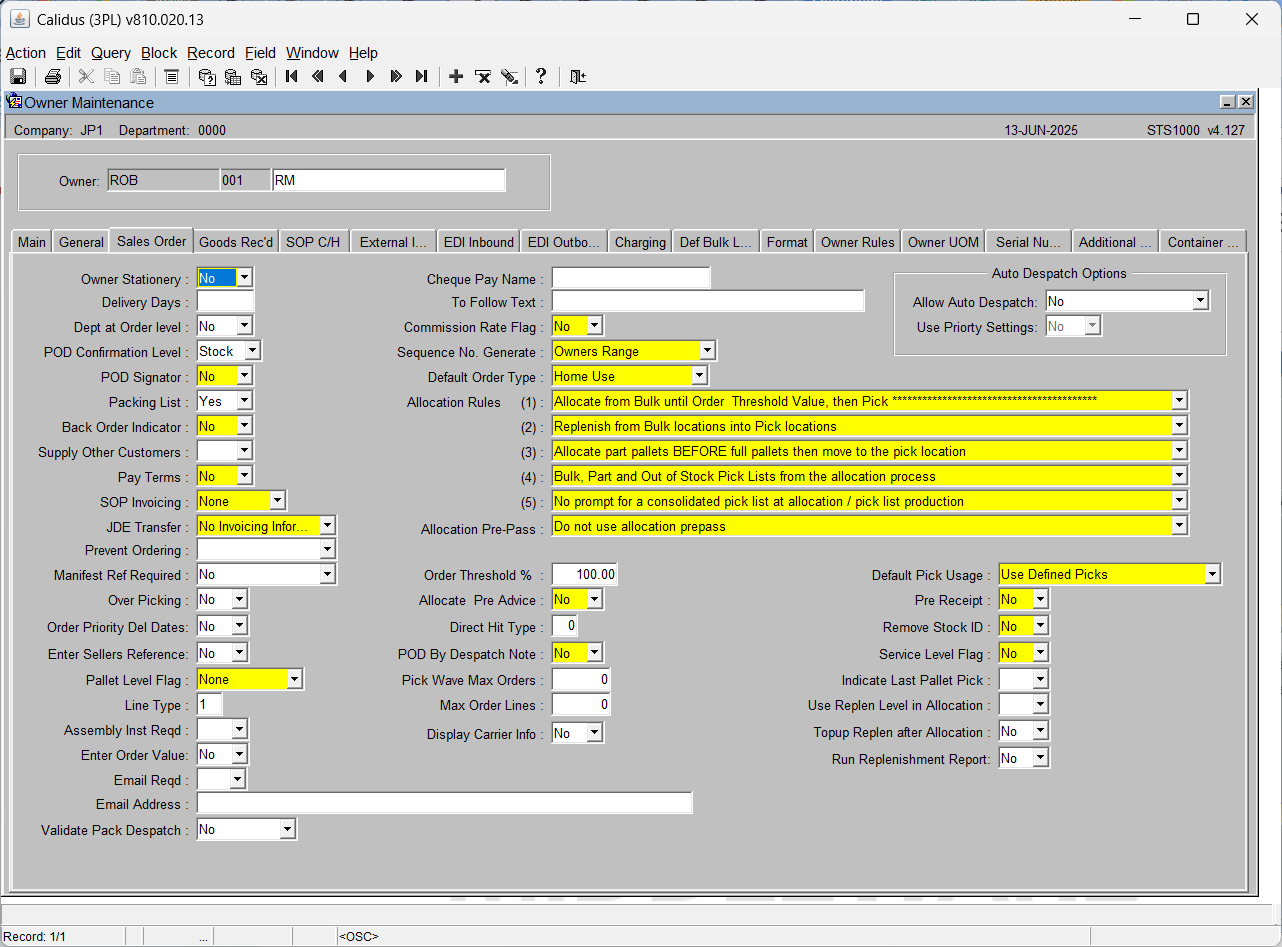
Owner Maintenance – Goods Received Tab
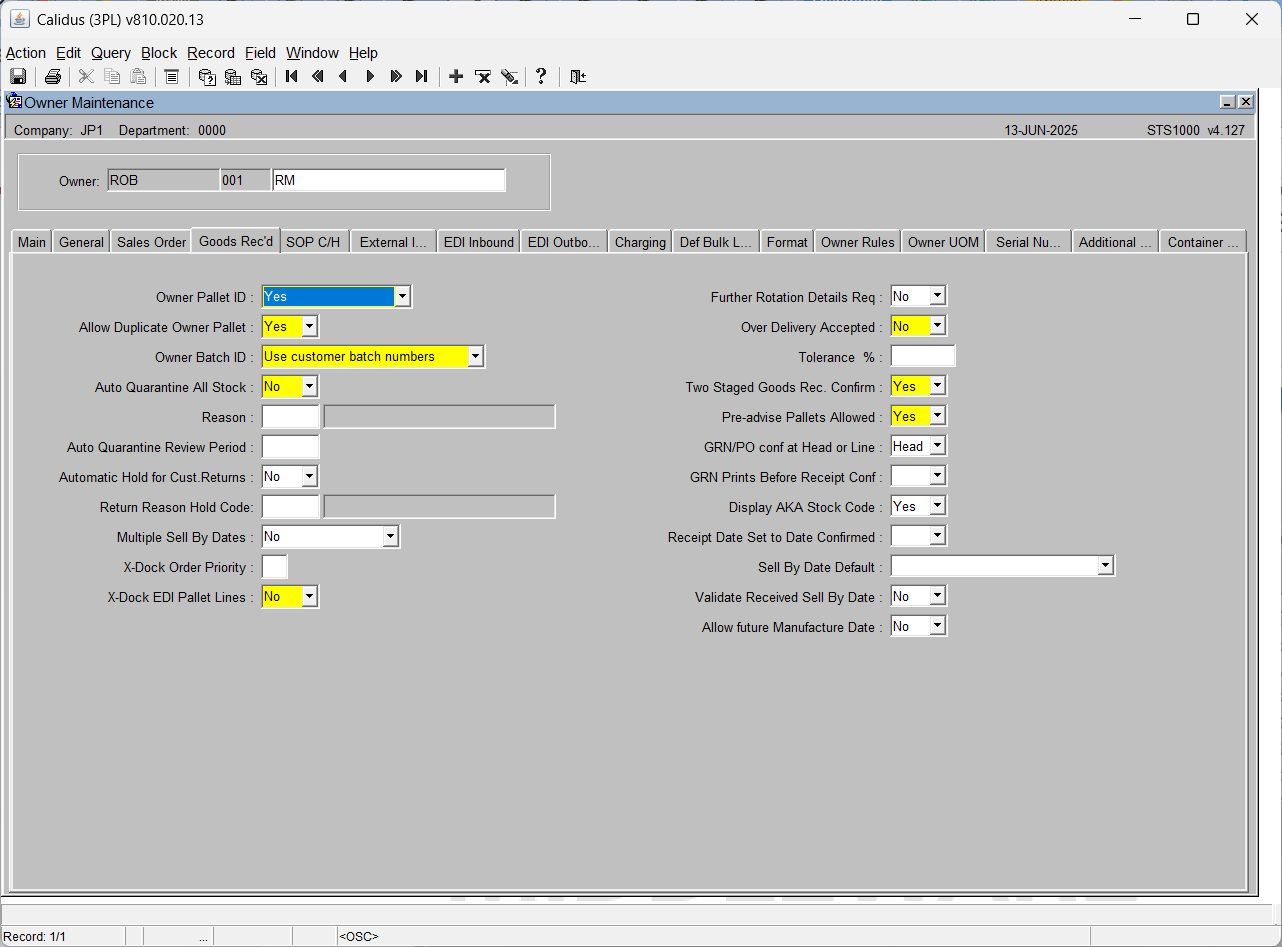
Owner Maintenance – SOP Charging Tab
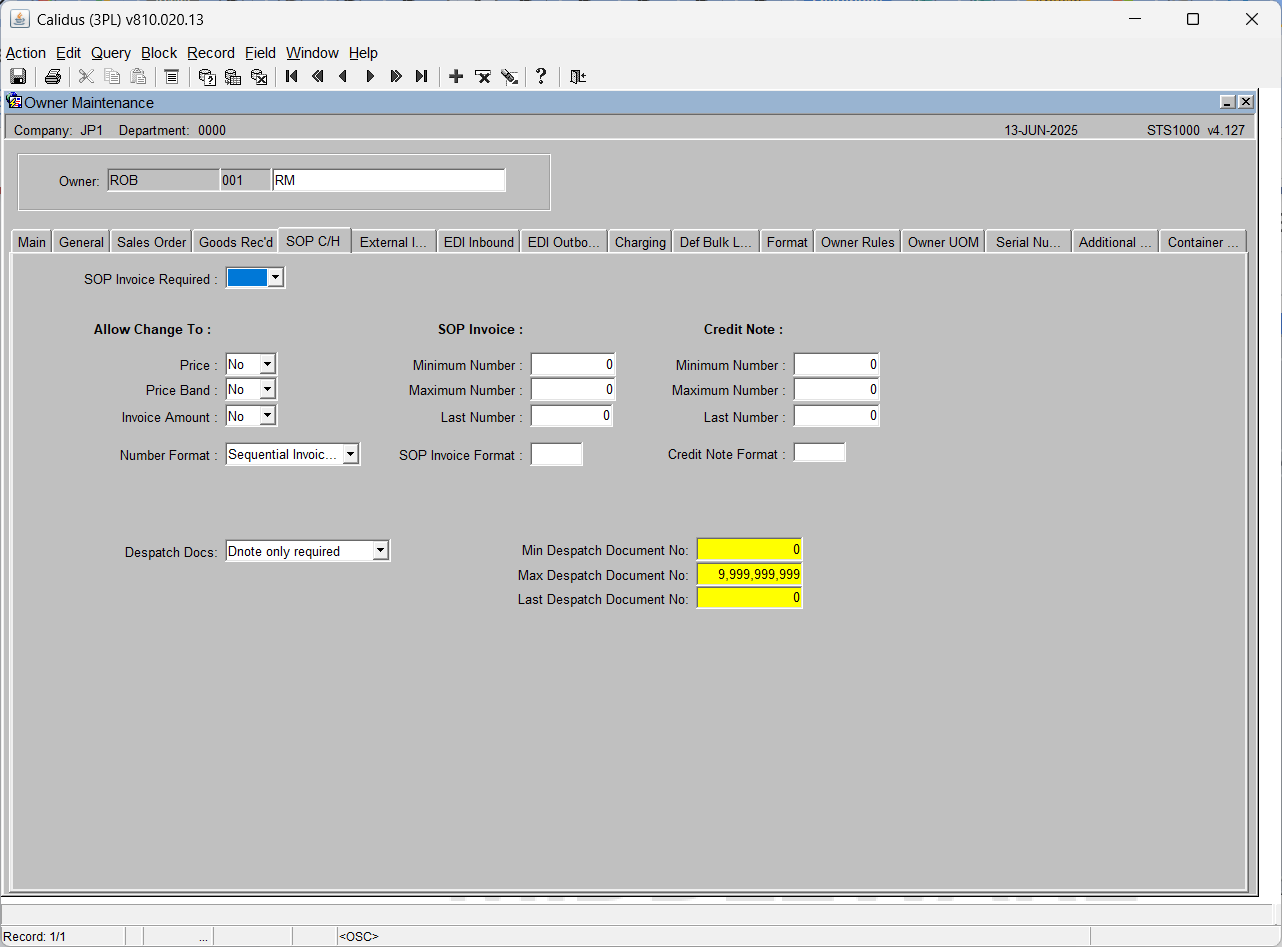
Owner Maintenance – EDI Tab
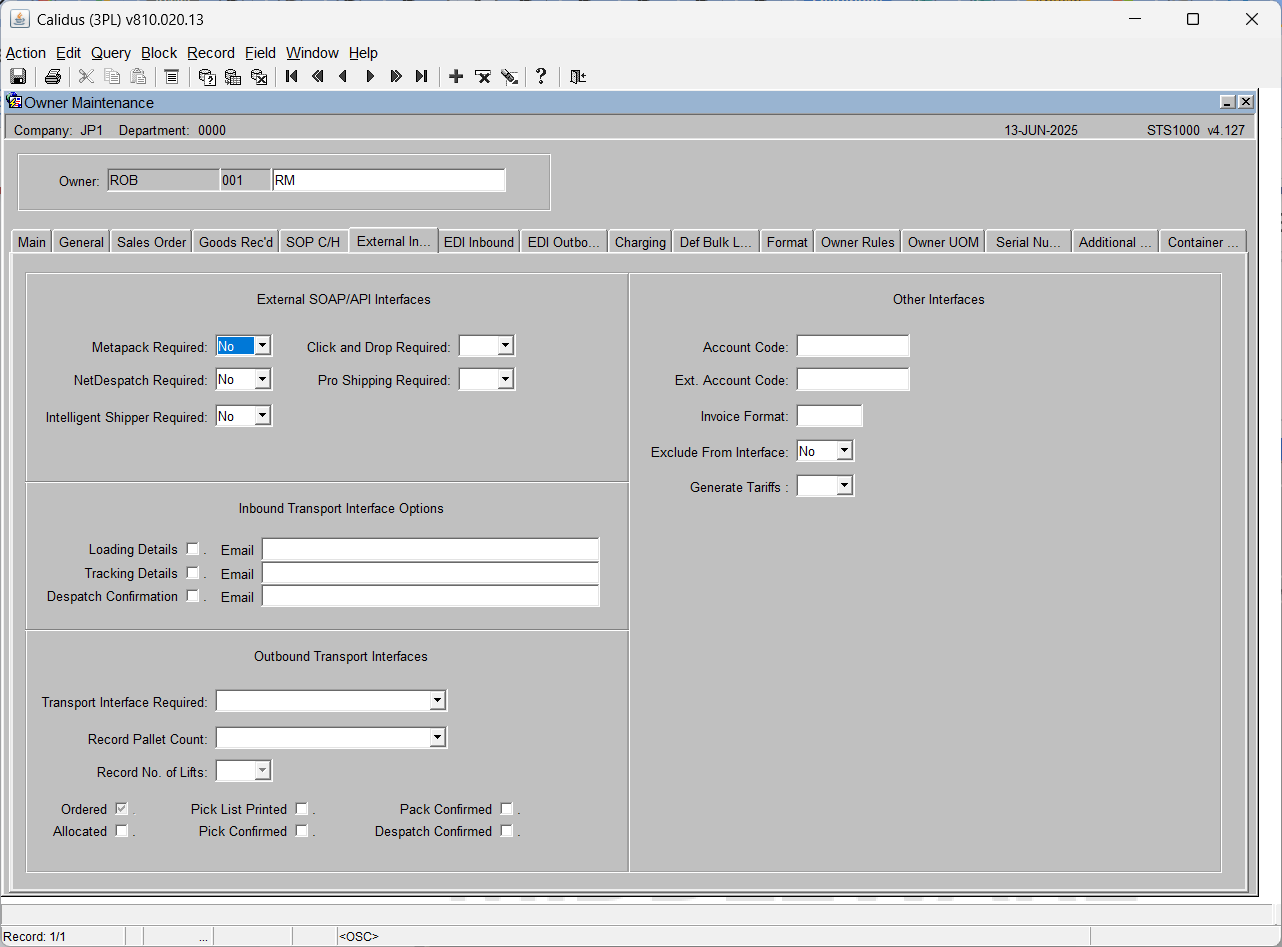
Owner Maintenance – EDI Inbound Tab
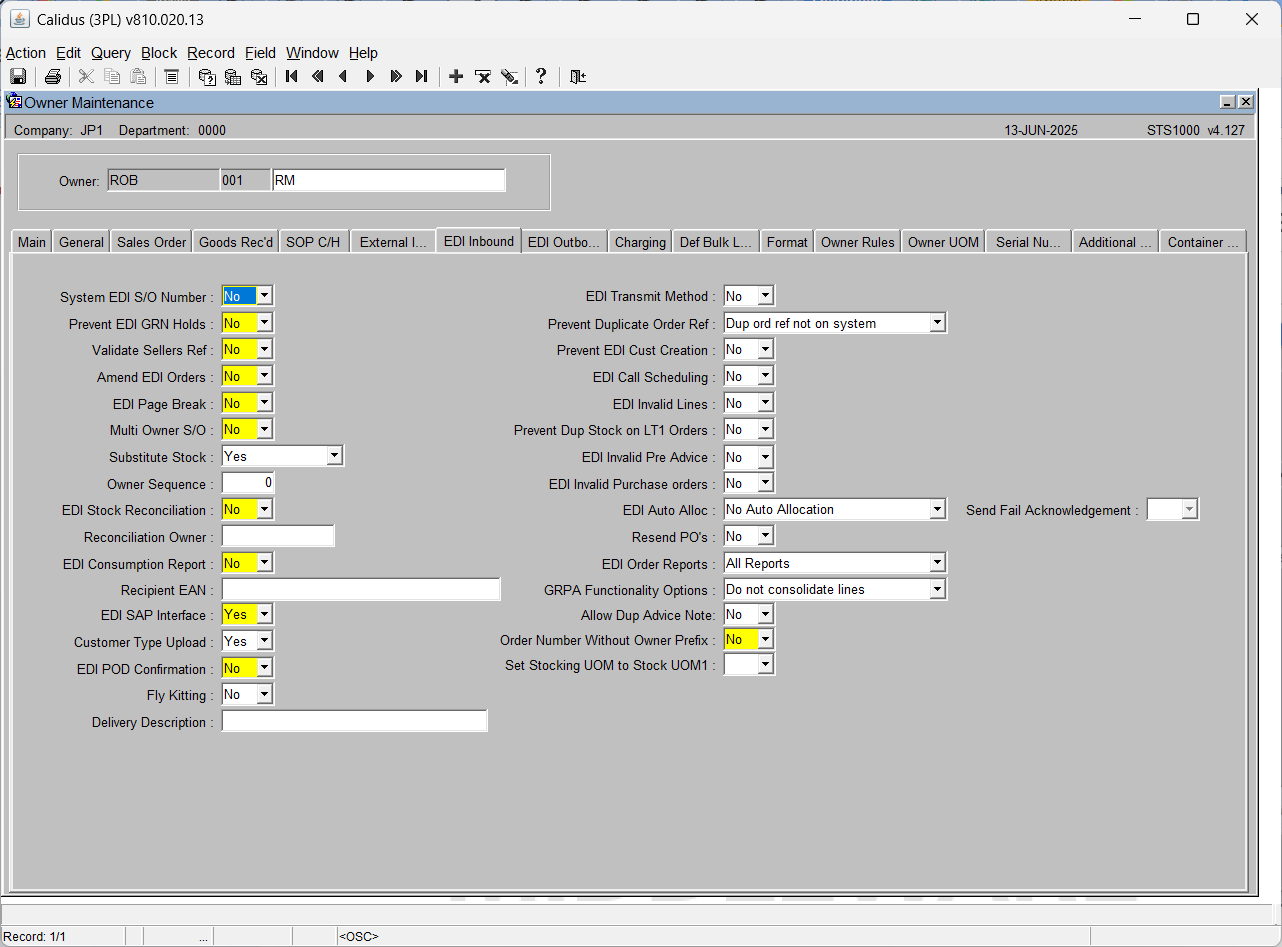
Owner Maintenance – EDI Outbound Tab
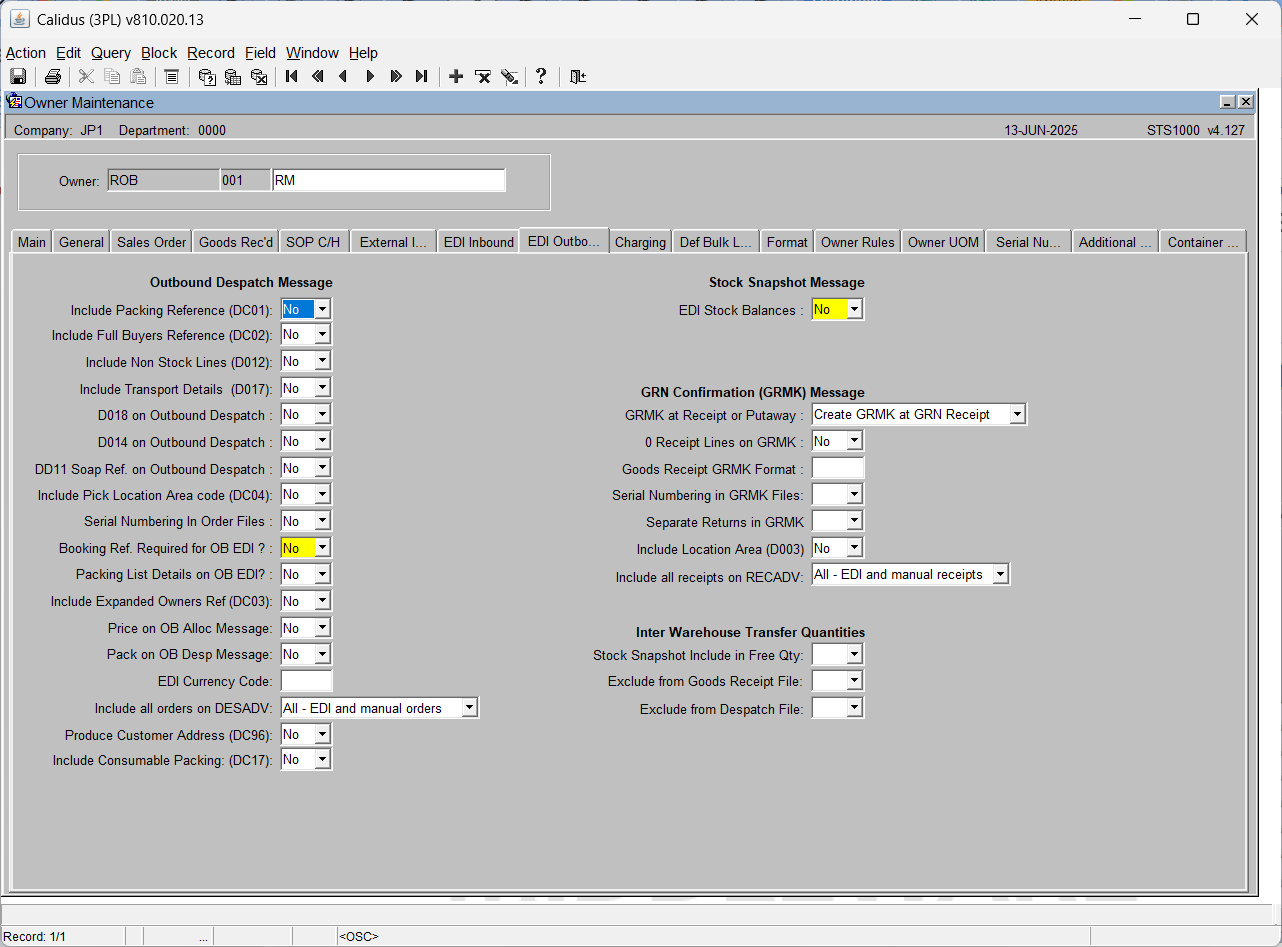
Owner Maintenance – Charging Tab
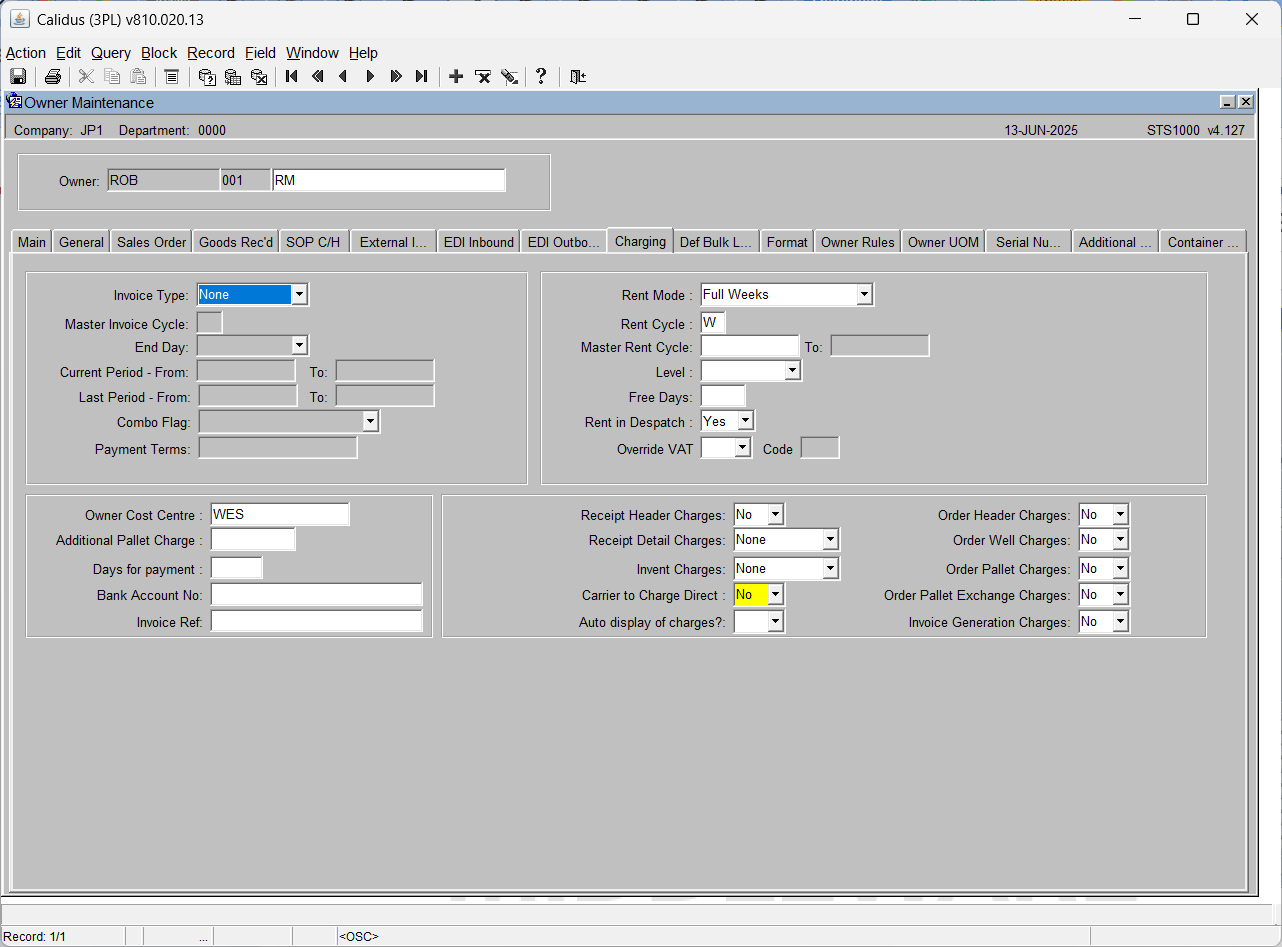
Charging Tab – Cyclical Charges, Charges Tab
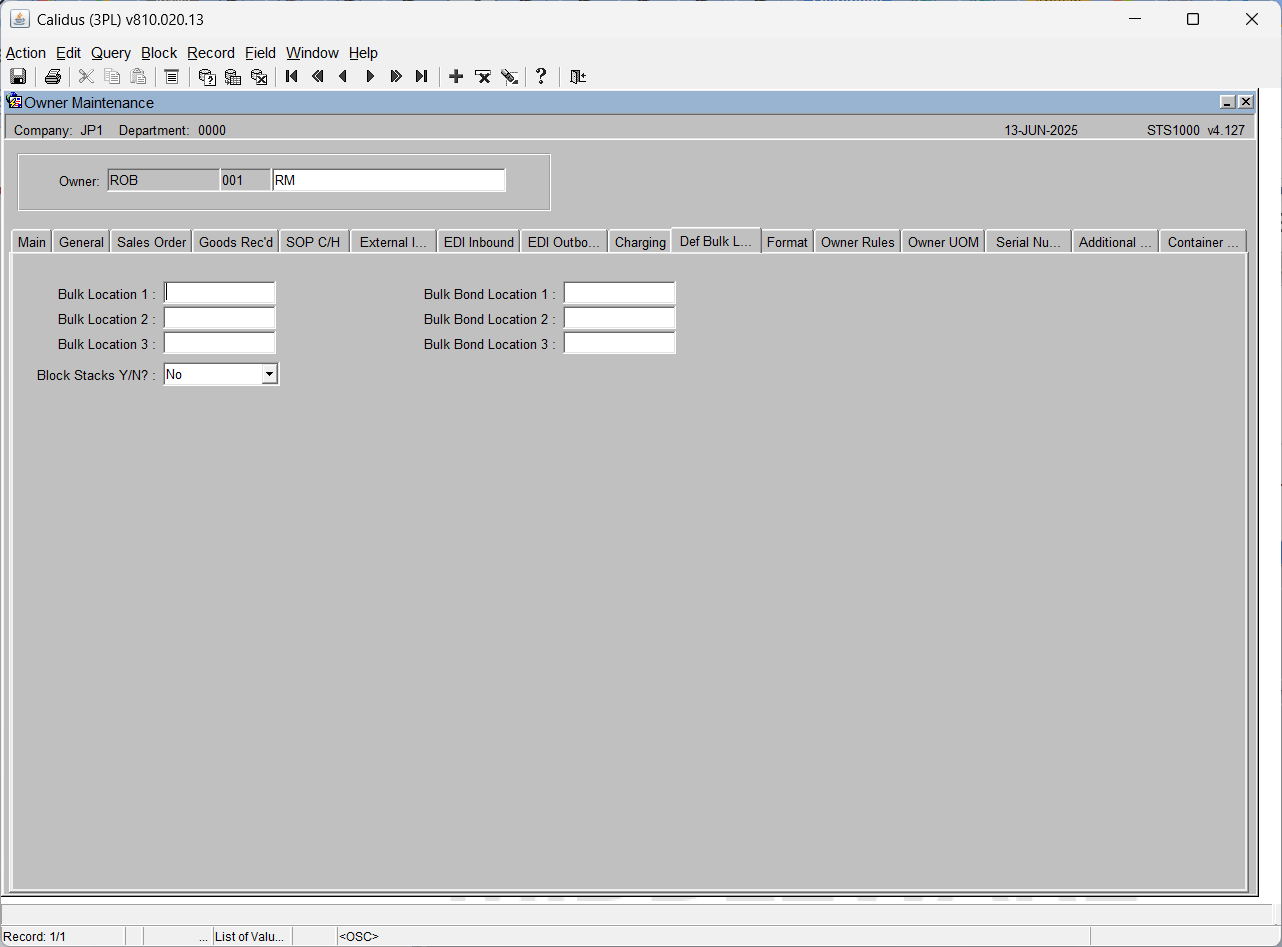
Owner Maintenance – Default Bulk Locations Tab

Owner Maintenance – Format Tab
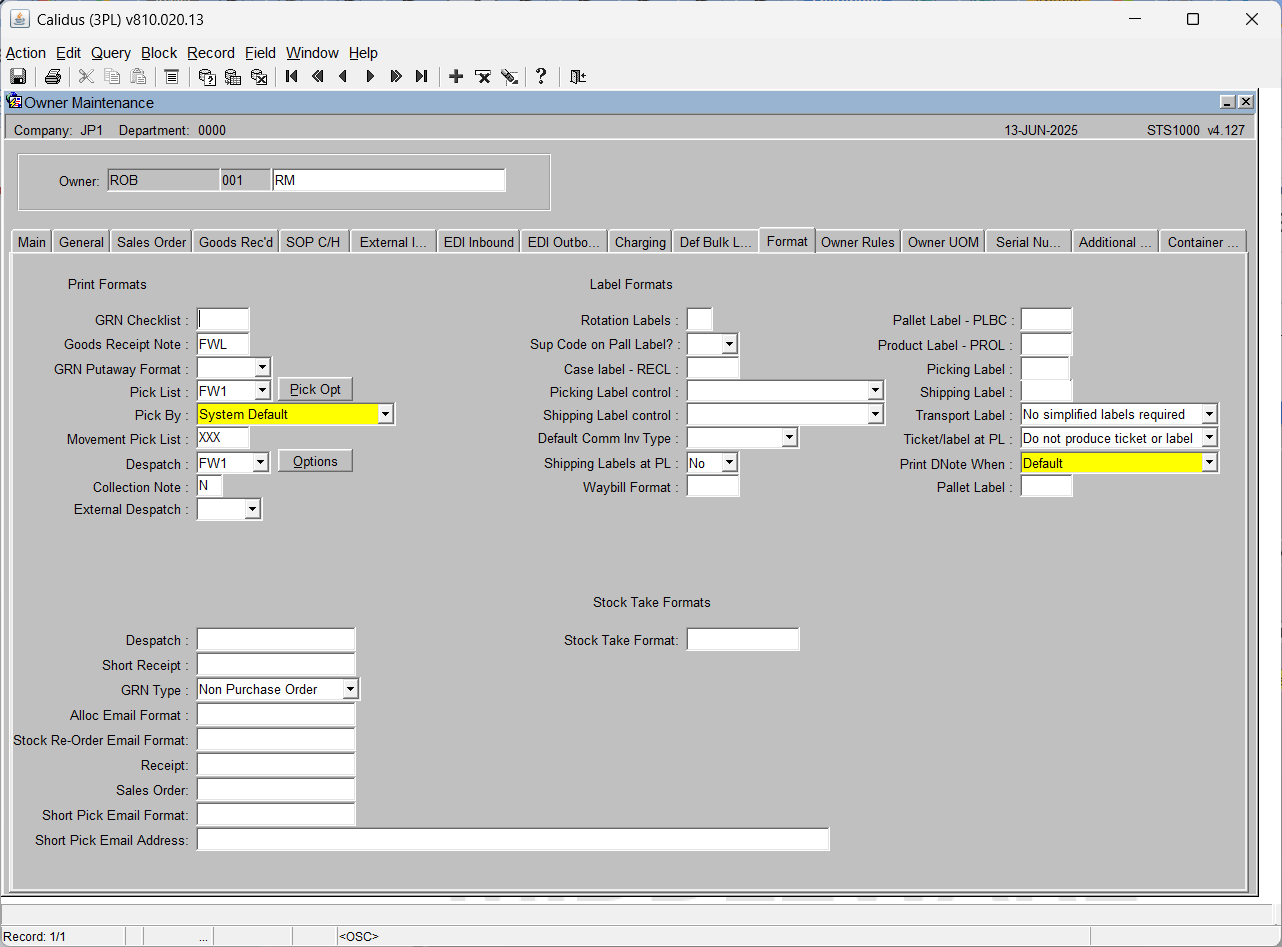
Owner Maintenance – Owner Rules Tab
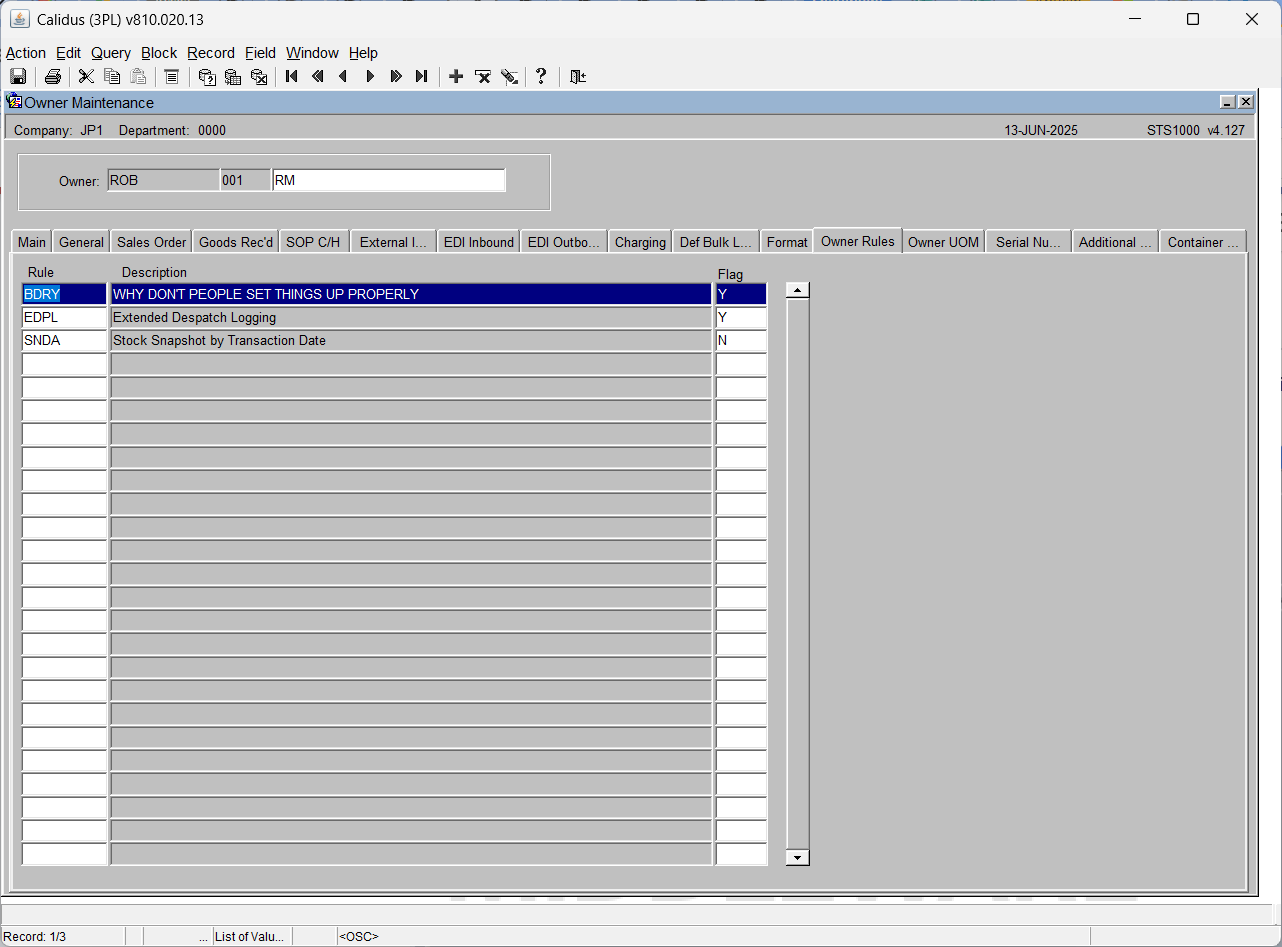
Owner Maintenance – Owner UOM Tab
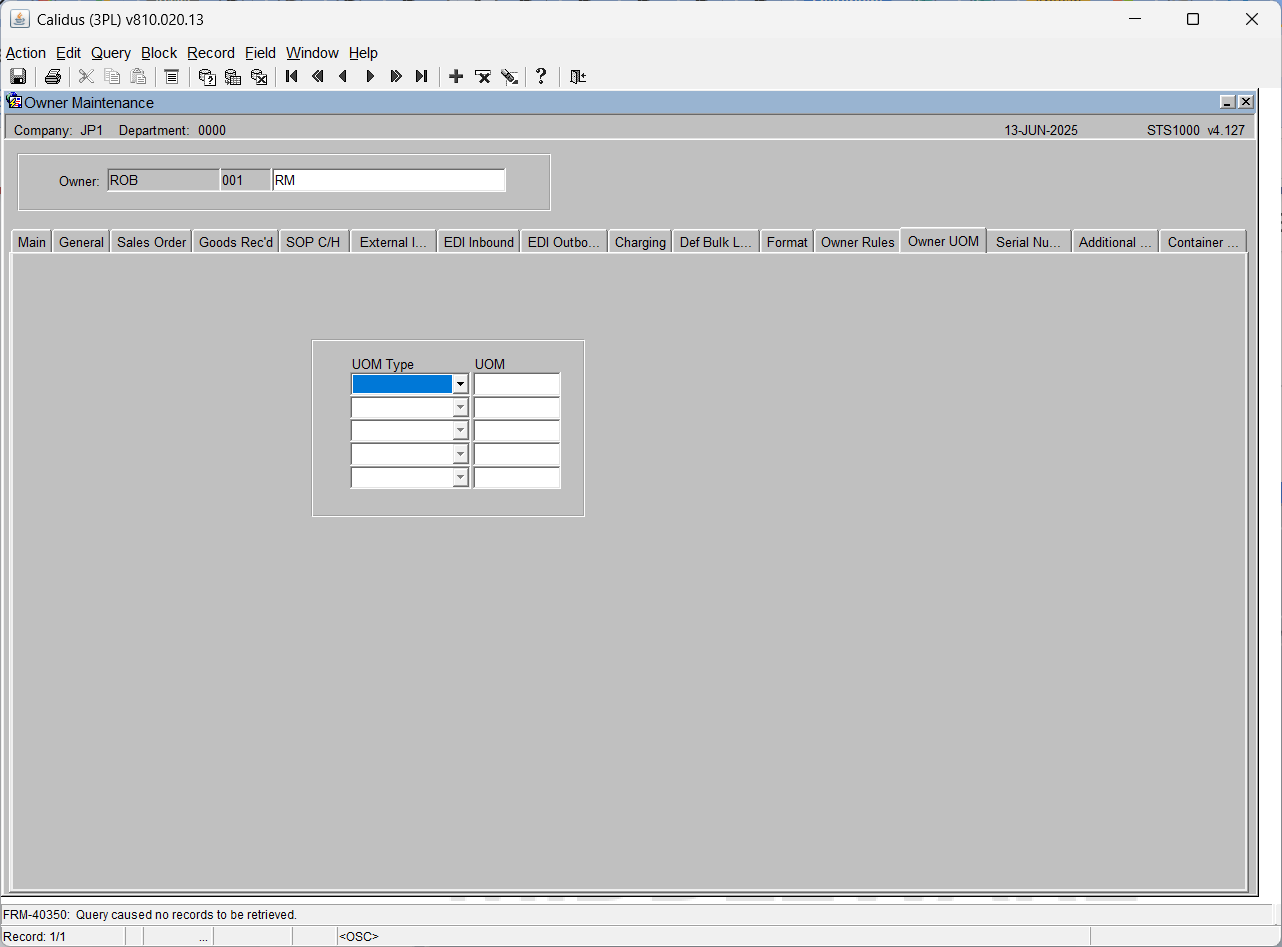
Owner Maintenance – Unit of Sale Tab
